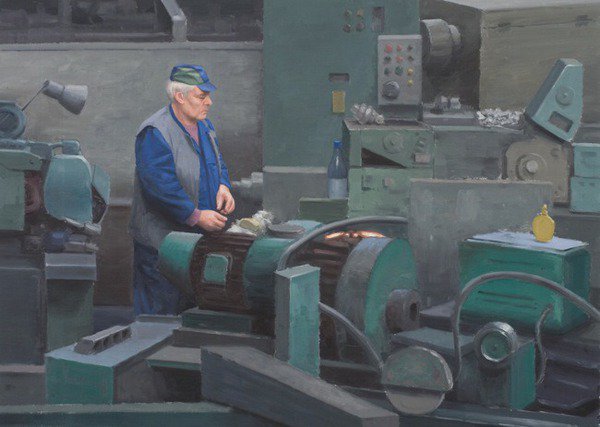Miklos Onucsan / Serban Savu
dal 27/10/2011 al 9/12/2011
Segnalato da
27/10/2011
Miklos Onucsan / Serban Savu
Mihai Nicodim Gallery, Los Angeles
Anthem of People's Love. Two romanian artists dealing with the theme of the woorking class in their country from the socialist to the capitalist economy.

Anthem of People’s Love
Miklos Onucsan and Serban Savu
Starting around 1917, a number of countries became ruled ostensibly in the interests of the working class. While arguments over standards of living and potential growth rates have occurred in academic history and sociology, the development indexes of these countries were often higher than other countries of equivalent gross domestic product. However, additional criticisms have been leveled at these countries for the presence of massive human rights abuses, which impacted primarily on workers, and for the lack of democracy within and amongst the working class. Some historians have noted that a key change in these Soviet-style societies has been a massive type of proletarianisation, often effected by the administratively achieved and forced displacement of rural population that ended up in urban environments as factory workers. Since then, states of this sort have either collapsed (such as the Soviet Union) or turned inwards into an increasing cycle of poverty and brutalization.
During the Russian revolution (1917-1918) a movement was initiated to put all arts in service to the dictatorship of the proletariat. The instrument created for this was known as the Proletkult. The ideas of Proletkult attracted the interests of Russian avant-garde, who strived to get rid of the conventions of "bourgeois art". Among notable artists of this movement was Malevich. However, the ideas of the avant-garde eventually clashed with the newly emerged state-sponsored direction of Socialist Realism. Proletkult grew out of the theory that socialism necessitated a rethinking of the role of arts. The theory suggested that the aim of socialist art was to enlighten the proletariat, and help the working classes achieve class-consciousness, without the process being dominated by bourgeois teachers; thus, control of socialist art properly belonged in the hands of the proletariat itself. The state-sponsored direction of Socialist Realism stated that whereas the unions would attend to the proletariat's economic interests and the communist party their political interests, the Proletkult would look after their cultural and spiritual life. A consequence of the state sponsored direction was bound to purge or alienate any artists in their ranks as soon as they became successful, since success, by definition, as an individual achievement, was clashing with the whole concept of Proletkult and class consciousness.
Serban Savu, born in 1978, witnessed during his childhood in socialist Romania this alienation of rural population, eradicated from their villages and sent to big cities to become factory workers. Throughout this process, the workers took cultural and political action to create their own cultures and positions within the new industrial society. Savu’s attitude towards the immiseration of traditional communities in order to produce workers and the vast surplus of production available from industrialization is deeply rooted in his work. The solitary figure in “A Moment of Silence” is a typical a worker in a factory, the definition of the proletarian, who dominates the setting, lost in thoughts remote from the work at hand and alienated from his labor. Mood and purpose are consistent in the painting “The Lathe Man” which portrays another factory worker impoverished by the quality of life in a socialist society. His mental functions seem altered in his current paradigm of work.
The work presented in this show by Romanian conceptual artist Miklos Onucsan spans over three decades, starting from the communist 80’s, through the transition to a market economy and democracy in the 90’s and till the present day, when Romania joined the European Union. Miklos Onucsan’s work thrives on the same concept of alienation and degradation of the human mind in a, as well as in the transition from the socialist to the capitalist economy when knowledge is not used anymore to question, analyze or resolve contradictions, but to assuage reality.
In a world where technological efficiency has increased production exponentially, by tenfold, the workers of society still dedicate the whole of their lives to survival, by way of production. The purpose is not luxury, happiness, or freedom, but production. The production of commodities is an end to itself; and production by way of survival. This is how the work “Hygene de L’Art. Contre Culture” was born. During Miklos Onucsan’s employment at the socialist state owned pattern factory “Crisana”, the fabric, which covered his work table, started to accumulate several layers of different patterns. The artist kept the fabric and, in 2008, added the two wooden poles and Herve Fisher’s stamp “Hygiene de L’Art. Contre Culture”, thus reflecting the way he dealt with the production process and alluding to a marching object in a very cynical nostalgic way.
Miklos Onucsan’s works are all made at a particular moment in time, closely related to cultural and political events, not random, and reflecting the artist’s own mechanisms of interpreting and processing these events. The work “It’s different because it’s the same, it’s the same because it’s different”, 2008, is made out of recycled toilet paper tubes, crowded together in a very ergonomic way, all the same, but different because of the way they were amassed together, adapting to the new order they were placed in. The mantle of history surrounds Onucsan’s practice, colliding with his own, thus becoming the starting point for discussing and understanding his work.
Image caption: Serban Savu - "A Moment of Silence", 2009, oil on canvas, 100 X 140 cm
Opening: Friday, October 28, 6 - 9 PM
Mihai Nicodim Gallery
3143 S. La Cienega, Unit B - Los Angeles
Hours: Tuesday – Saturday 11 – 6 pm
Free admission



